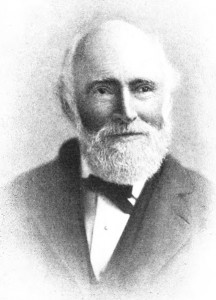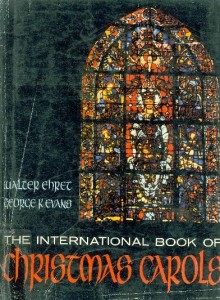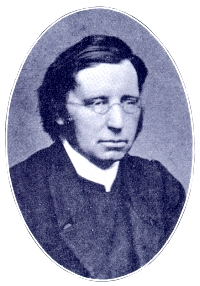Christmas Classics PERSON OF THE DAY: John Sullivan Dwight
On this date in 1893, John Sullivan Dwight died in Boston. He was one of the more compelling figures from Harvard University who were Christmas carol composers or translators. They included among others, Edmund Hamilton Sears (It Came upon the Midnight Clear), Henry Wadsworth Longfellow (I Heard the Bells on Christmas Day), and Rev. Phillips Brooks (O Little Town of Bethlehem). Dwight’s contribution was providing the English translation for O Holy Night after the French carol Cantique de Noël.
After graduating from Harvard Divinity School, John Sullivan Dwight served as a Unitarian minister in Northampton, Massachusetts. But his stay there was short-lived. He had to leave the ministry because he became deathly ill when he had to deliver sermons to his congregation. After leaving the ministry he became a recluse and then sojourned to the socialistic Brook Farm community, of which he was one of its founders. For five years there he lived a transcendental life teaching classical languages and music. Life on the commune also meant time for farming, cutting wood, cultivating trees, and other chores.
Eventually he returned to Boston and devoted himself to literature where he became America’s first influential classical music critic writing for Dwight’s Journal of Music. For several years it was the only musical journal in the country.
Dwight also cultivated an interest in European carol tunes, particularly the French carol Cantique de Noël (a.k.a. Minuit Chrétiens). A carol with an intriguing history, it became much disliked by French church authorities even though it had originally been well received by them and the church faithful. This turnabout led to criticism about the carol’s perceived lack of musical taste and because it did not possess the “spirit of religion.” But the repudiation of the carol may have been due to Placide Cappeau, the carol lyricist, and his socialist leanings and later renunciation of Christianity; not to mention the fact that Adolphe Adam, the composer of the carol melody, was Jewish.
Thirteen years after Dwight’s death the carol had the distinction of being the first ever heard on the radio. On Christmas Eve in 1906 ships at sea heard O Holy Night being played on a violin.
- John Sullivan Dwight
Christmas Classics PERSON OF THE DAY: George K. Evans
On this day in 1917, George K. Evans was born in Arkansas. He is most noted as a translator and co-author of the highly respected The International Book of Christmas Carols published by Prentice-Hall in 1963 and reprinted in 1980 by S. Greene Press.
Evans was responsible, along with colleague Walter Ehret, for including in The International Book of Christmas Carols many carols theretofore never published in English collections, especially Slavic, Scandinavian, and Spanish carols. Evans himself provided the notes and translations for most of the carols, as well as for the popular German carol O Tannenbaum. In addition he wrote a fine seven page introduction to the book.
Fifteen years ago I spoke with the retired co-author about The International Book of Christmas Carols. He was quite proud of his contributions, and rightfully so I told him, but expressed disappointment that the book wasn’t more aggressively marketed. When I hinted that most carol books generally do not have large print runs, Evans ever the gentleman concurred. When I further commented that I thought his oeuvre d’ hors was one of the finest 20th century carol collections, he was greatly pleased for the attention.
George K. Evans died at his home in North Hollywood, California in 2003. He will always be remembered and honored here as a significant contributor to the international Christmas music repertoire.
Christmas Classics PERSON OF THE DAY: Rev. John Mason Neale
On this day in 1866, the Rev. John Mason Neale died. A humble and scholarly Anglican priest, his reputation largely rests with his research and translations of ancient Greek and Latin religious texts, tasks that must have come easily to him since he was proficient in twenty-one different languages. The contributions of Neale to the revitalization of ancient and medieval church hymns and his deft translations of them cannot be underestimated. The brilliant scholar was known to have lamented the Reformation’s neglect of the rich history of hymnody, despite the movement’s praiseworthy restoration of worship and song to the language of the common people.
The Rev. Neale was also a well-respected composer of Christmas carols and hymns, some of which were delivered as a result of translating centuries-old hymns and songs, including those of a secular strain.
Three of those carols have grown quite popular since the publication of his 1853 collection Neale’s Carols for Christmastide. The most sacred was the carol hymn Veni, Emmanuel (O Come, O Come Emmanuel) based upon the Latin great O Antiphons of Advent whose seven verses are believed to have been composed by monastery monks who sang one verse per day at Vespers, the late afternoon or early evening canonical hour of prayer, for seven straight days prior to Christmas Eve.
Good Christian Men, Rejoice, the second carol, was Neale’s loose English translation of one of Germany’s best-loved carols, In Dulci Jubilo. Neale found the melody of this medieval Latin-German carol in Piae Cantiones, the famous 1582 Swedish book of carols that also produced the tune for Good King Wenceslas, the third familiar carol. For the latter, Neale was looking for a good role model for children. He found it in King Wenceslas of Bohemia who was known to be a just and merciful king and having considerable compassion for the poor and sick.
It could be said that King Wenceslas was also a role model for Neale himself since he, too, led an exemplary life by dedicating his life to the less fortunate. The hymn composer had a penchant for caring for the lowliest on society’s scale, and his Christian deeds set him apart from other clerics holding more lofty positions in the Anglican Church.
Such was Neale’s station in life that his own bishop, imagining Neale of Roman Catholic leanings, prohibited him from performing any ministerial duties and relegated him to a seemingly less desirable post. Thus, in 1846 Neale was made warden of Sackville College, a position he held for the rest of his life. Sackville College, however, was actually an almshouse, a charitable residence for the poor and aged. Twelve years later the humbly intrepid, and often frail and sickly, Neale founded the Sisterhood of St. Margaret, a group dedicated to the poor, needy, and suffering. For this charitable effort he was accused of a return to nuns, again earning him the enmity of Church authorities that thought he was converting to the Roman Catholic faith. Neale’s ministry later established an orphanage, a school for girls, and a home for unwed mothers, the latter forced to close due to church and local opposition. In a nutshell, Neale’s dedication to serving the poor and indigent was on a level with that of his work with sacred texts and hymns. Each pursuit was performed tirelessly, with dignity, and for the higher good.
Emmanuel, meaning “God with us,” is a splendid title for a carol hymn. It must have held special significance to Rev. Neale as he worked among the poor. The title reaffirms the religious concept of Christ’s birth as God Incarnate dwelling among men and announcing to them his mission here on earth. In the world of the ancient Hebrew, the choice of name was made judiciously, as the name Emmanuel must have been for Neale. For the scholarly Anglican priest, the name radiated in bold light and demonstrated, coincidentally, his own essential character and purpose as a man.
Today the Rev. Neale lays in peace at St. Swithun churchyard in East Grinstead, England, close to Sackville College where he abundantly served so well those who had so little.



